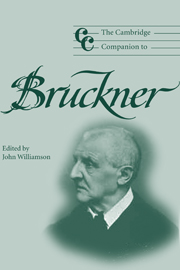2 - Musical life in Upper Austria in the mid-nineteenth century
from Part I - Background
Published online by Cambridge University Press: 28 September 2011
Summary
From assistant teacher in the ‘Land ob der Enns’ via professor of music to university lecturer in the capital city of Vienna: that is the astonishing career of Anton Bruckner, who finally in 1891 was also created an honorary doctor of the University of Vienna.
Bruckner was born into the Metternich era. Upper Austria, the land above the Enns, was an agrarian crown land of the Danubian monarchy that was stamped by a patriarchal social structure. The church and its representatives acquired great importance in that the spiritual was regarded as absolute authority. In cultural matters, the visual arts outranked music. From 1854 to 1861 the novelist Adalbert Stifter (1805–68) ran the Oberösterreichischer Kunstverein (founded in 1851) as vice-president, in which capacity he took steps to support numerous artists. On his instigation the Oberösterreichische Landesgalerie was founded. In poetry Stifter (who was also a painter) and the dialect poet Franz Stelzhamer (1802–74) achieved great influence. The dilettantism of the Biedermeier period initially played a great role in music. In the countryside folk music was intensively cultivated while in the towns and cities the nobility and art-loving bourgeoisie emerged as the driving force. The monastic foundations also played an important role in nurturing art and music.
- Type
- Chapter
- Information
- The Cambridge Companion to Bruckner , pp. 15 - 25Publisher: Cambridge University PressPrint publication year: 2004



